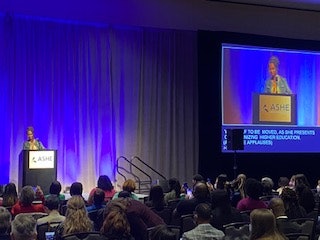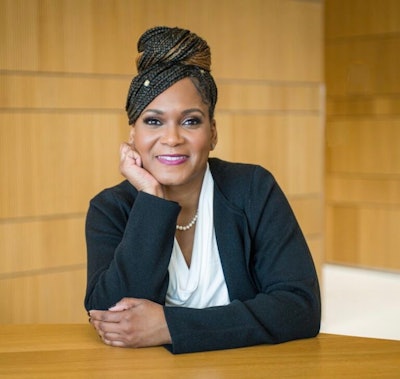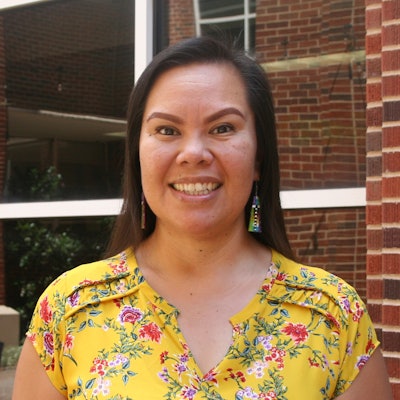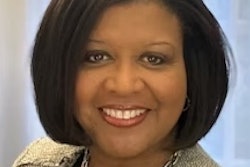 Dr. Joy Gaston Gayles addresses the crowd at the opening of ASHE's 47th Annual Conference.
Dr. Joy Gaston Gayles addresses the crowd at the opening of ASHE's 47th Annual Conference.
Dr. Joy Gaston Gayles opened the 47th annual conference for the Association for the Study of Higher Education (ASHE) in Las Vegas with a call to disrupt the systemic oppression keeping marginalized populations from accessing higher education and burning out academics working toward greater diversity, equity, and inclusion.
“If we want to disrupt systemic oppression, we need a model that prioritizes care, empathy, love, authenticity, healing, hope, collectivity, solidarity, and community,” said Gaston Gayles, president of ASHE and distinguished graduate professor and senior advisor for advancing diversity, equity, and inclusion at North Carolina State University. “These values run contrary to systemic oppression. In order to enact human values, we have to start with ourselves. Critical self-reflection is a radical form of resistance.”
The conference theme this year is humanizing higher education, and hundreds of scholars from across the country gathered here to share their research, resources, and make connections.
On the opening day, academics shared findings on student success at Tribal Colleges and Universities (TCUs), while others tackled issues of pay inequity in internships. The conference underscored the mission of postsecondary institutions and academics to work against dehumanizing atmospheres and support the best policies and practices that improve student belonging, community connection, and create thriving faculty.
“We first have to understand where we’ve been to think about what humanizing higher education can mean, a path forward in uncertain times,” said Gaston Gayles. “What happens in global society trickles down to all the microcosms of society, including higher education. After the past two and a half years in the COVID-19 era, heightened social and political unrest and violence, I think about where we’re headed as a society, association, and people.”
 Dr. Joy Gaston Gayles, president of ASHE and distinguished graduate professor and senior advisor for advancing diversity, equity, and inclusion at North Carolina State University.
Dr. Joy Gaston Gayles, president of ASHE and distinguished graduate professor and senior advisor for advancing diversity, equity, and inclusion at North Carolina State University.
“People are intentionally unplugging and choose to plug into work that aligns with their values,” said Gaston Gayles. “The notion we have to put our bodies on the gears to make the machine work—a machine that we don’t own, that does not care about us, only what we produce—we want off the machine. Higher education centers production over humanity, often based on production instead of improving people’s lives.”
Dr. Natalie Youngbull, an assistant professor of educational leadership and policy studies at the University of Oklahoma, shared research on how TCUs are improving the lives of their students and their communities. TCUs have a unique mission, Youngbull said, to not only provide relevant degree programs to their learners but to revitalize and sustain their tribal cultures, history, and languages in a way that permeates into the community.
Youngbull studied TCU concepts of student success by interviewing leadership and faculty at five different institutions in New Mexico, Arizona, and North Dakota. While TCUs are not a monolith, she found similarities in methodology. Many TCU leaders are focused on creating a familial environment on campus. The creation of a sense of family, and intrusive advising that comes not just from counselors but all touchpoints a student experiences, is crucial to student retention and student success, leaders told Youngblood.
 Dr. Natalie Youngbull, assistant professor of educational leadership and policy studies at the University of Oklahoma.
Dr. Natalie Youngbull, assistant professor of educational leadership and policy studies at the University of Oklahoma.
Kyoungjin Jang-Tucci, a Ph.D. student in the department of educational policy studies at the University of Wisconsin-Madison, explored the differences between paid and unpaid internships as a reflection of opportunity afforded to students of color who attend Historically Black Colleges and Universities (HBCUs), Hispanic-Serving Institutions (HSIs), and Predominately White Institutions (PWIs).
“Increasing evidence suggests that not all [internships] are desirable, especially unpaid ones,” said Jang-Tucci. “We estimate about one million college interns are unpaid for their work. And the unequal distribution of unpaid internships is exacerbating inequality.”
Jang-Tucci found correlations between a student’s race, their major, and their attendance at a Minority Serving Institution (MSI) or PWI to whether or not those students were offered paid internships. Fields in science, engineering, technology and math (STEM) and business were more likely to offer paid internships, while arts and humanities were less likely to pay. Government and non-profit internships were also less likely to pay their interns versus the for-profit industry.
“At HSIs, Latinx students are more likely to be paid for an internship,” said Jang-Tucci. “At PWIs, there’s no significant difference, and in terms of race, Latinx scholars at HBCUs are more likely to be paid than Latinx students at PWIs.”
These findings are just some in a field ripe with research opportunity, said Jang-Tucci. She hopes to see more research done on the different opportunities provided to students at MSIs and PWIs to better explore the mechanisms behind the results.
The conference will continue through Saturday, giving scholars a chance to share the work that’s helping to make higher education accessible and welcoming to students, faculty, and staff alike.
Liann Herder can be reached at [email protected].












